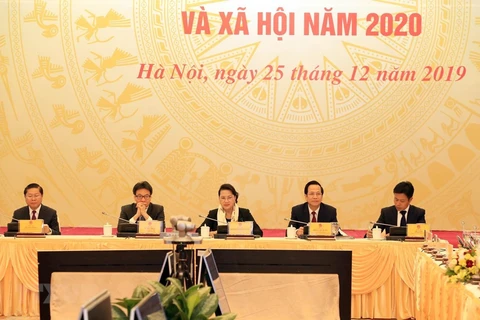Hanoi (VNS/VNA) - Vocational training schools in Vietnam will continue to use curricula transferred from Australia and Germany until the end of 2020 and 2025, respectively, following the Prime Minister’s approval to extend the technical vocational education and training (TVET) reform plan.
The plan, developed by the Ministry of Labour, Invalids and Social Affairs (MOLISA), aimed to develop high-quality TVET institutes, teachers and managers as well as pilot key vocational training courses at ASEAN and international levels.
According to MOLISA Deputy Minister Le Quan, Vietnam had 45 vocational schools offering 12 Australian courses and 22 German courses.
“Tuition fees for these courses are kept low while the diplomas they receive are issued by either our Australian or German counterparts,” he said.
Nearly 300 teachers have taken English language courses in Australia under the plan, and will go on to train other teachers in the vocational education sector.
Meanwhile, more than 260 teachers were sent to Germany to consolidate their lecturing and vocational skills in preparation for 66 new courses that started in November 2019.
The schools include the Lilama 2 International College, the Hanoi College of Electro-mechanics and the Hue Industrial College, which are highly valued for their facilities.
New opportunities
Nguyen Tien Thinh enrolled at Bac Ninh Province Electro-mechanics Vocational College after taking a gap year, a bad decision in the eyes of many Vietnamese people.
The programme, which is transferred from Australia, is much more demanding than the domestic equivalent. As trainees are requested to reach B1 English level, the 23-year-old spent a year studying the language.
“After another two and a half years of professional training, my English skills were good enough to work for foreign companies. If I go to work in Europe, I only need to submit the English certificate besides the vocational education diploma,” Thinh said.
“Having both professional and English languages skills are advantages for the programme’s graduates.”
Vu Hoai Phuong, director of Hue Tourism College in Thua Thien-Hue province, said collaboration with foreign vocational training colleges helped Vietnamese counterparts approach international standard curricula. Graduates from Hue Tourism College’s two courses on resort management and tour guide training following Australian standards secure improved job opportunities.
“Our transferred programmes are evaluated by German experts. After any session, trainees have to fill an assessment form. These programmes also ask trainees to have a one-year internship at companies, accounting for 30 per cent of the curricula,” said Dong Van Ngoc, director of Hanoi College of Electro-mechanics.
The school has offered two German courses of industrial electricity and metal cutting since the end of 2019 with 16 trainees for each class.
Extension
Prime Minister Nguyen Xuan Phuc urged Vietnam’s vocational training to efficiently promote labourers’ skills at Skilling up Vietnam – the country’s largest-ever forum on vocational training held in Hanoi in November 2019.
He stressed that the population of nearly 100 million people was the economy’s major engine, not natural resources.
“Labour skills, management skills, intellectual capacity and professional capacity determine national growth,” said PM Phuc.
“Expanding the scale and improving the quality of vocational training plays an important part of creating skilled human resources and increasing productivity,” he added.
However, the percentage of domestic businesses working with vocational schools remained low at 12.3 per cent, according to a report released by the National Assembly's Committee for Culture, Education, Youth, Adolescents and Children released in last October.
Loose cooperation made it difficult to improve vocational education, satisfy the market’s rising demands for workers and solving unemployment in Vietnam, the report said./.
The plan, developed by the Ministry of Labour, Invalids and Social Affairs (MOLISA), aimed to develop high-quality TVET institutes, teachers and managers as well as pilot key vocational training courses at ASEAN and international levels.
According to MOLISA Deputy Minister Le Quan, Vietnam had 45 vocational schools offering 12 Australian courses and 22 German courses.
“Tuition fees for these courses are kept low while the diplomas they receive are issued by either our Australian or German counterparts,” he said.
Nearly 300 teachers have taken English language courses in Australia under the plan, and will go on to train other teachers in the vocational education sector.
Meanwhile, more than 260 teachers were sent to Germany to consolidate their lecturing and vocational skills in preparation for 66 new courses that started in November 2019.
The schools include the Lilama 2 International College, the Hanoi College of Electro-mechanics and the Hue Industrial College, which are highly valued for their facilities.
New opportunities
Nguyen Tien Thinh enrolled at Bac Ninh Province Electro-mechanics Vocational College after taking a gap year, a bad decision in the eyes of many Vietnamese people.
The programme, which is transferred from Australia, is much more demanding than the domestic equivalent. As trainees are requested to reach B1 English level, the 23-year-old spent a year studying the language.
“After another two and a half years of professional training, my English skills were good enough to work for foreign companies. If I go to work in Europe, I only need to submit the English certificate besides the vocational education diploma,” Thinh said.
“Having both professional and English languages skills are advantages for the programme’s graduates.”
Vu Hoai Phuong, director of Hue Tourism College in Thua Thien-Hue province, said collaboration with foreign vocational training colleges helped Vietnamese counterparts approach international standard curricula. Graduates from Hue Tourism College’s two courses on resort management and tour guide training following Australian standards secure improved job opportunities.
“Our transferred programmes are evaluated by German experts. After any session, trainees have to fill an assessment form. These programmes also ask trainees to have a one-year internship at companies, accounting for 30 per cent of the curricula,” said Dong Van Ngoc, director of Hanoi College of Electro-mechanics.
The school has offered two German courses of industrial electricity and metal cutting since the end of 2019 with 16 trainees for each class.
Extension
Prime Minister Nguyen Xuan Phuc urged Vietnam’s vocational training to efficiently promote labourers’ skills at Skilling up Vietnam – the country’s largest-ever forum on vocational training held in Hanoi in November 2019.
He stressed that the population of nearly 100 million people was the economy’s major engine, not natural resources.
“Labour skills, management skills, intellectual capacity and professional capacity determine national growth,” said PM Phuc.
“Expanding the scale and improving the quality of vocational training plays an important part of creating skilled human resources and increasing productivity,” he added.
However, the percentage of domestic businesses working with vocational schools remained low at 12.3 per cent, according to a report released by the National Assembly's Committee for Culture, Education, Youth, Adolescents and Children released in last October.
Loose cooperation made it difficult to improve vocational education, satisfy the market’s rising demands for workers and solving unemployment in Vietnam, the report said./.
VNA
























